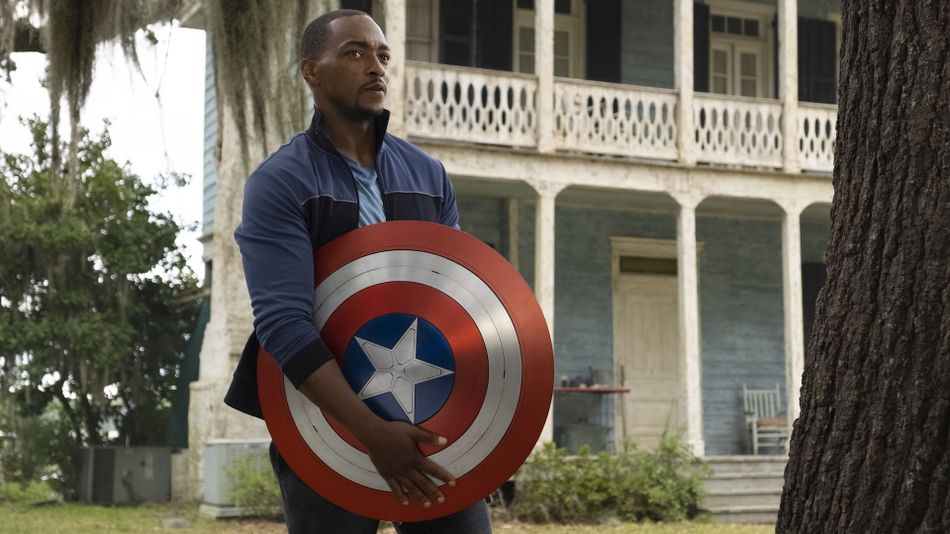
Image: disney
The Falcon and the Winter Soldier was the story of its heroes inheriting the mantle of Captain America, and its musical journey is no different. Composer Henry Jackman wrote the show’s music after his work on Captain America: The Winter Soldier and Captain America: Civil War, in which he took up the musical mantle originated by Alan Silvestri. Jackman has been with the MCU for almost as long as Sam and Bucky, and it only made sense for him to mirror their journey as they continue Steve Rogers’ legacy.
“It was a sort of combination of musical heritage and musical exploration and musical transformation, which is all inherent in the characters,” Jackman told Mashable in a Zoom interview, about his experience scoring The Falcon and the Winter Soldier. “It has all these musical repercussions that are really cool, some of which are revisiting, some of which are expanding, and some of which are changing.”
Since Jackman knew the characters already, he rarely faced moments when none of his musical options worked. His primary task was growing an established world, such as by adapting a minor musical phrase for Falcon from Captain America: The Winter Soldier into a larger theme for this show.
“He would always disappear and the action would move on,” Jackman recalls of previous movies. “So I only ever got to do this one phrase, but I always thought it was the beginning of something that could last longer and actually be a fully developed superhero theme. You can imagine my delight when I got to put together ‘Louisiana Hero.’ When the brass comes in halfway through that track, it’s using that initial Falcon motif, but then it expands and finishes the whole thing, which is a really satisfying musical experience because you’re revisiting something you started ages ago.”
[embedded content]
The same approach wouldn’t quite work for the artist formerly known as the Winter Soldier, Bucky Barnes. “The Winter Soldier” from its eponymous Captain America movie is “a deeply unpleasant listen full of screaming” (“If you want to relax, don’t listen to the Winter Soldier track”) that wouldn’t work for the civilian Bucky in TFATWS.
“It’s barbaric and metallic and completely disturbed,” Jackman elaborates. “It’s supposed to represent a tortured soul trapped in a metal body. [On this show,] there are occasional outbursts, when he goes back into Winter Soldier mode, but then there was this other musical identity for him that was a lot more sympathetic, with guitar, piano and strings.”
Jackman is less traditional than Silvestri (whom he admires greatly); the guitar riffs in “Louisiana Hero” and similar tracks recall his work on X-Men: First Class a decade ago. Like the Winter Soldier scream (which he kindly demonstrates over Zoom), Jackman’s existing MCU work is less about longer melodies than distinct, transportive phrases. The main theme of Civil War appears multiple times with slight alterations, invoking the film’s character dynamics while simultaneously indicating how they’ve shifted.
“There’s a more developed string theme for Zemo that takes 30 seconds or a minute to use and that gets used a lot,” he says. “But every now and then in film score, you need something shorter, something like a motif… That’s why I also had the dadadaDAa cause you only need about three seconds for that, and it’s like an identifier.”
Another fun part of Jackman’s “musical heritage” was Alan Menken’s “The Star-Spangled Man,” Captain America’s war bonds theme song that gets a bumpin’ marching band rendition in TFATWS.
“You’ve got a track, it works,” Jackman says. “Then it’s… jazzy brass layers, it’s how to get some extra zhuzh in there without compromising what already works. You mustn’t fill it up with so many extra elements, you lose the essence of what was good about it in the first place — there’s a delicate balance, like cooking a dish that already works, but we want to kind of make it sparkle a bit more.”
Jackman isn’t the first to describe a live-action Marvel show as feeling like a movie split in many parts, and he too appreciated a chance to explore backstory more freely. Scoring the show was “a combination of rummaging around in the musical heritage, adjusting, adapting, developing and coming up with completely new stuff,” like Flag Smashers motifs that explored the group’s equally dystopian and idealistic views.
As a composer, Jackman hardly has input on which characters and storylines make it into the Marvel Cinematic Universe. He’s been with Sam and Bucky for almost their entire MCU tenure, but the future is still up to Kevin Feige.
“Depending on the circumstances, it’s just there’s plenty of musical opportunity,” Jackman says, whether it’s more of the show or a new Captain America movie. “But half the fun is… you have no idea what’s at hand. It could be anything from completely new material to slightly unexpected story twists that require different ways of looking at material that you already have.”
The Falcon and the Winter Soldier is now streaming on Disney+.
